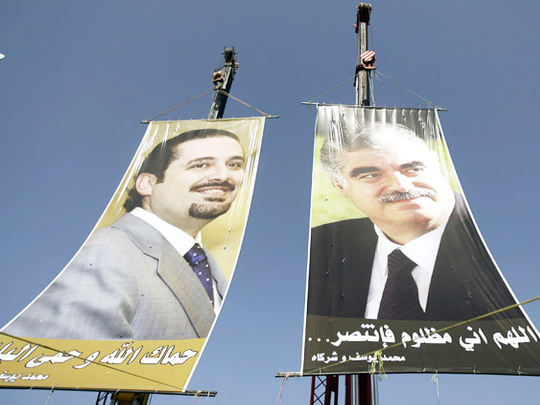
Beirut: Hezbollah is undermining democracy in Lebanon by trying to torpedo a UN tribunal investigating the death of a former prime minister, members of the country's pro-Western bloc have said.
The statement on Friday comes as Lebanon endures its worst political crisis in years.
Many observers fear there could be violence if Hezbollah members are indicted by the court, which was set up to prosecute the assassins of former Lebanese Prime Minister Rafik Hariri.
"Lebanon as an entity and democratic country is in grave danger," said Amin Gemayel, a former president who spoke after a meeting of Christian politicians allied to Prime Minister Saad Hariri, the son of the slain leader.
Gemayel said Lebanon is being forced to choose between justice and peace.
The UN tribunal has caused deep divisions within Lebanon's already fractious government, which includes Hezbollah and its allies along with pro-Western blocs.
Hezbollah leader Sheik Hassan Nasrallah has called on the Lebanese to refuse to cooperate with the tribunal and has vowed never to hand anyone over for prosecution in the case.
Nasrallah says the court is biased and has been poisoned by "false witnesses" who misled the investigation.
The bombing that killed Rafik Hariri along Beirut's Mediterranean waterfront on February 14, 2005, was one of the most dramatic political assassinations the Mideast has seen.
A billionaire businessman, Hariri was Lebanon's most prominent politician after the 15-year civil war ended in 1990.
Concerns about violence stem in part from the vast number of weapons in the hands of Hezbollah, which is the country's strongest armed force.
The group says it keeps its own arsenal, separate from the national army's, to protect the country against archenemy Israel.
But the weapons issue has long been a contentious one in Lebanon. On Friday, the statement read by Gemayel urged President Michel Suleiman "to put an end to the duplicity of weapons and restrict the responsibility of defending Lebanon to the legitimate forces backed by the Lebanese people."
In 2008, sectarian street clashes pitting supporters of Hezbollah against Sunni rivals in Beirut nearly plunged Lebanon into another civil war.
Strains on the government were being felt elsewhere as well on Friday. More than 1,000 people carrying anti-government banners protested rising living costs, including food and petrol price hikes, in the southern port city of Sidon.
Meanwhile, at the UN tribunal in The Hague, the court's president, Antonio Cassese, rejected an application to disqualify two Lebanese judges from considering a Lebanese general's request to see documents he claims will demonstrate that his four-year detention by Lebanese authorities for alleged links to Hariri's assassination was based on false evidence.
Cassese said the judges, Ralph Riachy and Afif Chamseddine, "have no personal interest in or association with" the appeal by Major General Jamal Al Sayyad.
Cassese also used his decision to underscore the court's impartiality, saying that the judges were selected for their experience and "high moral character."
Al Sayyad has argued the judges were "tainted by the very fact of their nomination to the tribunal by the government of Lebanon," the court said in a statement.
Meanwhile, France's U.N. ambassador said the UN Security Council expressed concern about the recent attack on three staff members of the tribunal set up to prosecute the assassins of Lebanon's former prime minister.
Ambassador Gerard Araud spoke in New York after a briefing by the UN's top legal officer, Patricia O'Brien, on the October 27 attack on members of the tribunal's investigation team in Beirut.












